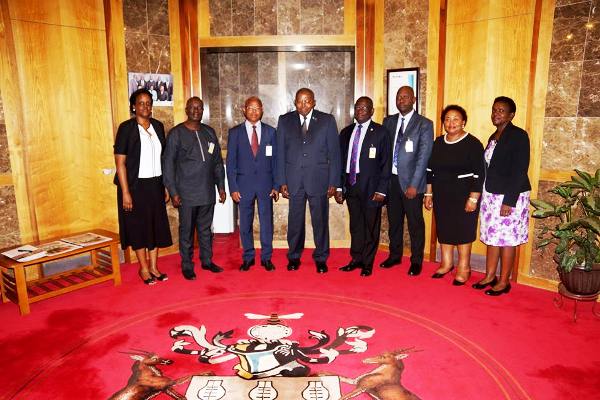Prof. Emmanuel Tumusiime-Mutebile, Governor, Bank of Uganda, has once again assured politicians that nobody will interview with the indepence of the Central.
He made the remarks at the Hosting of the Parliament of Ghana Finance Committee Members at a Benchmarking Exercise to Bank of Uganda on Thursday, September 27, 2018.
Mutebile spoke about the relationship between Parliament and the Central Bank, saying it (the relationship) is complex and not always well understood. He explained that the 1995 Ugandan Constitution confers independence on the Bank of Uganda. Specifically the Constitution states that: “In performing its functions, the Bank of Uganda shall conform to this Constitution but shall not be subject to the direction or control of any person or authority.”
“What does this mean in practice? In essence it means that the Bank of Uganda is free to implement its core policy responsibilities, which are monetary policy and bank regulation, without political interference. For example, the Government cannot give instructions to the Bank of Uganda with regard to setting the policy interest rate,” Mutebile said.
He added: “There is a very strong economic rationale for Central Bank independence, because independence gives monetary policy and bank regulation more credibility with the private sector, which in turn improves incentives for the private sector to act in ways which are consistent with low inflation and financial stability. This is why Central Bank independence has become an important characteristic of modern central banking around the world.”
He however acknowledged that a Central Bank is a public institution and a public institution must be accountable to the public, through its elected representatives in Parliament.
“Consequently, although Parliament cannot give instructions to the central bank on how to implement its responsibilities, it must be able to provide oversight of the operations of the central bank and make criticisms of it where this is warranted,” he said.
The main bodies within Parliament which provide oversight of the Bank of Uganda are the specialist committees, in particular the Committee on Commissions, Statutory Authorities, and State Enterprises (COSASE) and the Public Accounts Committee (PAC).
The Bank of Uganda’s annual report and audited accounts are submitted by the Auditor General to the Speaker of Parliament, who can refer them to a Parliamentary Committee.
“Myself and my staff frequently appear before Parliamentary Committees, both to answer questions about our own operations and to explain our views in regard to economic and financial issues,” Mutebile said, adding: “If a Central Bank is to maintain the confidence of the public in the independence of its operations, it must be prepared to be fully transparent and explain its actions to legislators and to listen to the views of these legislators, who represent the public.”





